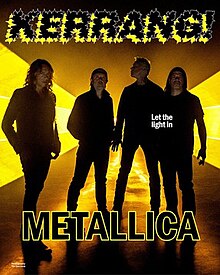
Back Kerrang! Catalan کێرانگ! CKB Kerrang! Czech Kerrang! Danish Kerrang German Kerrang! Spanish کرنگ! Persian Kerrang! Finnish Kerrang! French Kerrang! Hungarian
 Cover of 12 April 2023 digital issue of Kerrang! featuring American heavy metal band Metallica | |
| Editor | Luke Morton |
|---|---|
| Staff writers | Nick Ruskell, David McLaughlin, Emily Carter, Tom Shepherd, Ethan Fixell, Christopher Krovatin, Cat Jones |
| Frequency |
|
| Publisher | Wasted Talent Ltd |
| Founder | Alan Lewis |
| First issue | 6 June 1981 |
| Country | United Kingdom |
| Based in | London |
| Language | English |
| Website | kerrang |
| ISSN | 0262-6624 |
Kerrang! is a British music webzine and quarterly magazine that primarily covers rock, punk and heavy metal music. Since 2017, the magazine has been published by Wasted Talent Ltd (the same company that owns electronic music publication Mixmag).[1] The magazine was named onomatopoeically after the sound of a "guitar being struck with force".[2]
Kerrang! was first published on 6 June 1981 as a one-off "Heavy Metal Special" from the now-defunct Sounds newspaper. Due to the popularity of the issue, the magazine became a monthly publication, before transitioning into a weekly in 1987. Initially devoted to the new wave of British heavy metal and the rise of hard rock acts,[3] Kerrang!'s musical emphasis has changed several times, focusing on grunge, nu metal, post-hardcore, emo and other alternative rock and metal genres over the course of its forty-year publication history. In 2001, it became the best-selling British music weekly, overtaking NME.
After publishing a total of 1,818 issues, Kerrang! ceased publication of their weekly magazine in March 2020 amidst the COVID-19 pandemic, whilst continuing as an online publication featuring digital "cover stories". In December 2021, the print edition of Kerrang! was revived, and is now published on a quarterly basis.
- ^ Spanier, Gideon (15 April 2017). "Mixmag buys Kerrang! and plans to revive The Face in double acquisition". Campaign. Archived from the original on 3 January 2018. Retrieved 2 January 2018.
- ^ Ruskell 2023, p. 14.
- ^ Brannigan, Paul (6 June 2006). "25 Most Important Bands of Our Lifetime". Kerrang!. No. 1110.